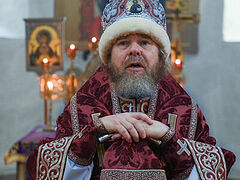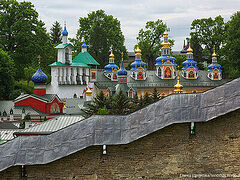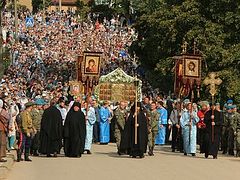Happy is the man who has a place on the earth that he loves more than anything, a place where his heart lies. A place, a land, that as the ancient tales say, gives him strength. And for me, this place on the earth is the Pskov Caves Monastery. It’s the most beautiful, most beloved place, and can never be replaced in my heart. Although I grew up in Moscow, and have been to many places in Russia, to many other countries, there is no more beautiful, warmer, closer place than the Pskov Caves Monastery.
I thank God with all my heart that thirty-one years after I had to leave for Moscow on obedience, He heard my prayers. Thirty-one years went by, and I returned here. How could I ever have imagined that I, first a pilgrim and then a novice in the cow barn, would return to the Pskov Caves Monastery, which was wholly then and still is for me a sacred place, from every stone to every person, and though sinful and unworthy, become its abbot. But this happiness did not last long (smiles)—only five years. The Lord tears us away from what the heart becomes attached, even the spiritual. The heart must be attached only to the Lord Jesus Christ Himself. Only this is worthy and meet—all else is a mixture of the lofty and the human, the passions, and tender feelings—not divine, but human, emotional. Therefore, the Lord changes situations in life—sometimes inside the monastery, and sometimes outside of it.
I would like to thank with my whole heart the brothers of the monastery for lovingly and condescendingly receiving me here as their brother, as their old friend and comrade; and that they tried to help in every way, although I was at times not right—but they corrected me. And this gave us the opportunity to more rightly do our common work. And our common work here, besides personal salvation, is the good of this monastery. It is absolutely alive. This is an especially living being—of course, in a certain connotative sense. But if it is as we heard today [the feast of the Protection of the Mother of God] in the tradition concerning Roman the Sweet-Singer—the church is filled with worshippers, and the Most Pure Theotokos herself is present here—this place truly is completely special and lives its own life. And people who come here, even the unbelieving, this monastery transforms and gradually leads to the faith. And each of us knows a great multitude of such instances.
I would like to thank the monastery itself with all its inhabitants, both living and those who have gone on to the Lord, with the guardian angels, the spirits of the righteous, with all who abide here in the heavenly world, who instruct us, console us, give us the right thoughts, and fill us with courage when the moment comes that is according to God’s Providence, but not completely fathomable to us.
I would like to thank the parishioners of our monastery, the Pskovians and pilgrims, for their great spiritual feelings for our monastery. Some people come, take a look, yawn, and leave—“Well, yeah, it’s not bad.” But there are people who are of one soul with us and feel an absolutely special beauty, the unearthly beauty of this place.
I would like to thank our reposed fathers, whom I had the honor to know, and those whom I never saw but who participate in the life of this monastery.
I would like to thank the Pechorans, who have courageously endured all my furious activity in transforming the town of Pechory. Of course there was some remonstrance, many grumbled, and are now saying, “Well, how do you like that, he’s dug everything up and now he’s leaving.” Don’t worry my dears, it will all be dug back in. The sewer pipes, the heating pipes—it will all be buried again by winter. And above it all will spring parks, beautiful houses, wondrous streets, park benches, playgrounds, sports complexes for the youth, where the kids can run around and work off their energy. In the middle of the pond will be an island, and on the island will be risers, and on these risers artists will sing beautiful songs, and the Pechorans will sit in this ancient amphitheater and listen to these songs. Wind orchestras will come and play marches and waltzes from the early twentieth century. And I, God willing, will also come and listen to them. Then the next stage of renovation will start, and some will start grumbling again: “A-a-a, the Muscovites have swarmed in, what are they doing here?” That’s okay, you’ll just have to be patient. Everything will be alright. There will be a beautiful skating rink beyond the water tower. And there’ll be lots more. I am sure that Fr. Hilarion [the abbatial locum tenens], the new leaders in our region—and well, I’ll also be a little bit nearby—we’ll finish it all, so that not only in the monastery but all around it Pechory will be the nicest, prettiest, and tastiest place in Russia; in any case in Northwestern Russia.
I would like to thank His Holiness Patriarch Kirill, who suddenly and unexpectedly told me, “You’ll be the bishop of Pskov and the abbot of the Pskov Caves Monastery.” This was totally unexpected for me, I couldn’t even have dreamed about such heights. I could dream—well, as long as they’ve made me a bishop, maybe St. Petersburg, or something like Crimea, in the warmth. But Pechory… I didn’t dare to dream. Well, dreams come true and quickly pass.
I wish you, dear fathers, brothers, and sisters, to “take the precious from the vile” as the Prophet Jeremiah said (Jer. 15:19). Take from what has been done here, redone here, and find the beautiful and good; and continue on, Fr. Hilarion.
Of course, I thank Fr. John (Krestiankin) and all our elders. I understand how important it was to come to them, to ask them for help and wisdom. This is incomparable power and truth, to come to them at their graves and as a sinner, a sinful son, ask with my whole heart for their help and instruction. And the Lord is now giving an answer through them.
Brothers and sisters, may the Lord save you; forgive me a sinner if I have done anything wrong, if there have been some mistakes. If I have offended anyone, forgive me and bless me. God forgives you and blesses you. And pray for me. That is a different diocese there, a large one. It has its complexities; but I will always be happy if someone comes in the midst of the heat… What is Crimea? What was Crimea in Ancient Greece? The Kolyma! It was the Kolyma! For us it’s Crimea, but for them it was a place where people didn’t live a normal life. People were exiled to there—St. John Chrysostom, and St. Clement, Pope of Rome. To the Kolyma! And now I’m being sent to the resorts in the Kolyma. No, of course it’s beautiful there. Beautiful… but it’s not Pechory.
May the Lord protect you!



